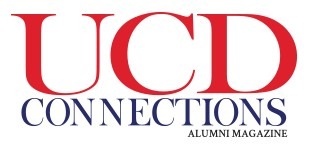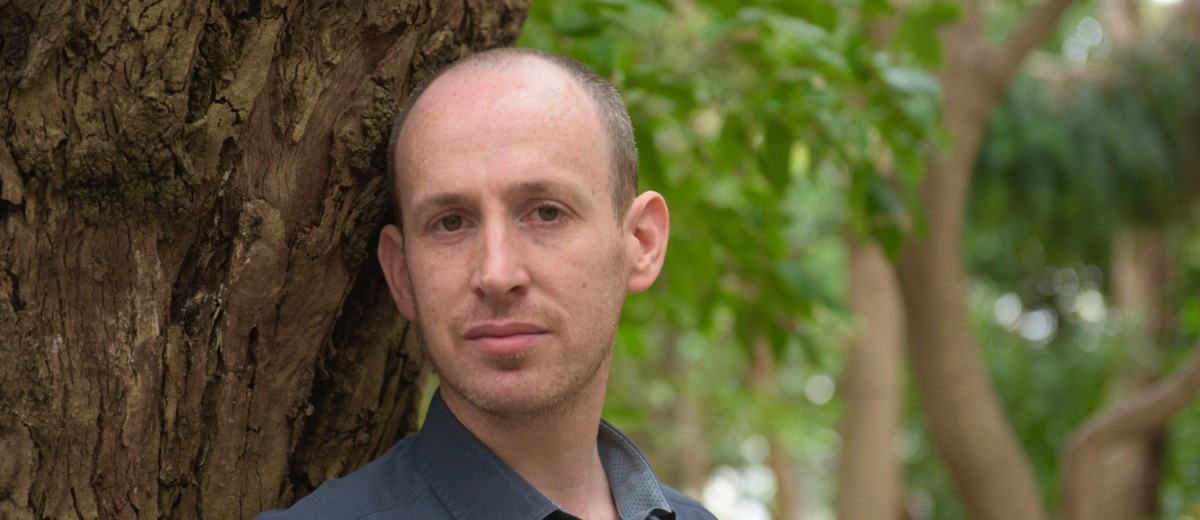Dr Chris Murray teaches literature at Monash University in Melbourne, Australia. He is also the author of Crippled Immortals, a book about his experiences studying a Zen martial-arts Masters in Asia. In previous years, Murray was in a rock band that recorded professionally and performed around the world. He has lived in Australia since 2017, having spent a couple of years in Singapore and a decade in the UK.
1. What was your UCD experience like?
I studied English with Greek and Roman Civilization, graduating in 2002. It was a time of change. The smoking ban came in during my studies, and I also remember working in the Students’ Union shop when you would take in Punts and hand back Euros. The Celtic Tiger was living large, the IT boom was afoot, and there was optimism about the place. I spent too many hours in the old Student Bar and was involved in the Shaolin Kung Fu Club. In my studies I got to work under world-leading experts like J.C.C. Mays and Michael Lloyd, whose lessons have stayed with me.
2. What is your fondest memory from that time?
The sense of community about the place. The friends I had and, in many cases, still have both in Ireland and here in Australia. I don’t think I’d pick out a single episode so much as that I’d always seem to run into someone and go off for tea between lectures, or venture into the record and book stores in the city together.
3. How did you end up in your current area of work?
At UCD I got especially interested in Romanticism and wanted to do a masters just on writers like John Keats and Samuel Taylor Coleridge. So I moved to Bristol to study in 2003, which was the place for Romanticism. I planned to go on to a PhD in North America but had met someone significant in the UK and stayed on there. It was hectic. During my studies I supported myself by temping, and I took leave from the PhD to focus on the band before committing to academic life. My personal interest in Asia crept in – I began to think about how nineteenth-century writers shaped Western ideas of Asia. So I leapt at the chance to spend a couple of years at Nanyang Technological University in Singapore after my PhD, then on to Durham, and most recently Melbourne.
4. When did you decide to write a nonfiction book?
When I knew I had a story on my hands.
I’d developed my interest in Zen martial-arts during my UCD days and when I moved to the UK and Singapore I kept it up. In Asia I learned that the practices were very different, sometimes because the masters kept things to themselves, and often from the forces of commerce affecting versions in the West. The masters had amazing life-stories too: one had escaped a POW camp during the Japanese occupation of China, trying to live anonymously in a Malaysian village until fate intervened. They are often mysterious and charismatic people, and they explain things with reference to a rich tradition of mythology and philosophy. I travelled in Malaysia and China investigating these histories and studied with an old disciple of the art at his home in Singapore, often one-on-one. So there was a storytelling opportunity about people and practices that are not well understood.
5. How long did it take you to write your book?
I’m slow and very careful. I weigh every sentence. About seven years passed between starting and publishing Crippled Immortals. Finding the correct way to write about it took me a long time; how to describe physical exercise that has a great deal of spiritual and historical baggage. Understanding the dynamics of a traditional Chinese group is hard. There were lots of obstacles; people telling different versions of the same incidents, or wanting to conceal the history, or trying to present themselves as major players when they weren’t. Eventually I realised that I should write about this difficulty itself, often leaving things ambiguously so the reader decides what the true version is.
6. What is your work schedule like when you’re writing?
I’m a sprinter rather than a marathon runner. I tend to focus for a couple of hours, then do something else. Writing is broken into stages. In the morning I might generate new material, and later in the day revise something. Of course I have lots of other duties too in my job, so it’s rare that I’ll take an entire weekend off.
7. How do you balance your work as an author, academic and critic?
The boundaries between those activities have dissolved, and having a book for general readership is definitely a good thing for an academic. Creative writing is one of the strings to my professional bow. Crippled Immortals looks at kinds of cultural transmission, like my academic research does. And my academic research is about why we think about China the way we do, and the role of the literary imagination in that process. I’m now writing an academic book on China for Oxford University Press, but it’s full of silly jokes – writing for a general audience has made me put the research in more accessible terms.
8. How would you compare being an academic in Australia compared to Ireland?
To date I haven’t worked for an Irish institution. Monash and UCD have fairly similar profiles though: cosmopolitan campuses in great cities. Academia is a globalised profession, so we cooperate internationally and face similar challenges.
9. What is the proudest moment of your career to date?
I tend to see achievement as in the past and not to reflect on it. It’s lovely to see a book come into the world, and to get warm reviews, but usually I’m looking to the future and thinking about the next thing. It’s been rewarding when people have been in touch to say that my book inspired them to take up new hobbies. I like being asked to do things as well – to take part in groups, or give talks, or contribute to writing-projects – it suggests I can’t be doing too bad a job.
10. What have been the most challenging aspects of your career?
Getting a foot in the door in universities is challenging these days, and getting a book published is every bit as hard. It was the same having music released. You’re up against intimidating numbers, and disappointing outcomes usually take the form of impersonal emails that leave you none the wiser. Persistence and self-belief are needed in good measure.
11. What advice would you give to someone who is just beginning their career now?
To focus on the things that are within your control. You should take useful advice where available, but you can’t predict how people will respond, whether they are audiences or recruitment panels. And the opportunities that arise might not be the ones you expect. So do what you are doing as well as you can, and good things will follow.
12. Which do you prefer to watch TV shows or movies? What ones would you recommend to a friend?
I like each format for different reasons. Rick and Morty is a favourite these days. The Irishman was star-studded greatness.
13. Would you ever consider reuniting the band, even just as a hobby?
Carving out the time would be difficult, but it might be a project for when I retire.
14. What was the last song you listened to?
The Frozen 2 soundtrack gets a lot of airtime in my house, so it was ‘Into the Unknown’.
16. You have lived in several countries around the world. Which has been your favourite to visit or live in and why?
So far Melbourne has been the best, partly because it brings together things I like about the other places. There’s a considerable Irish community, and great Asian food. Of course, I’m involved with a local kung fu group. Home seems best from afar, but Melbourne is where my opportunities are for now.
17. If you could choose to work in another field or profession, which would it be and why?
I’d quite like to run my own restaurant, in which I’d be the chef. It would be called Love It or Shove It, and I would only offer one meal a night. I find cooking therapeutic: when you line up all the ingredients and equipment you need, and allow yourself plenty of time, it’s a rare occasion when things will seem entirely within your grasp.
18. What is your go-to dish to cook when friends are visiting?
Gumbo.
19. Describe yourself in three words.
Wordy. Thinky. Silly.
Twitter: @DrChrisMMurray
https://www.bookdepository.com/Crippled-Immortals/9781925801347

